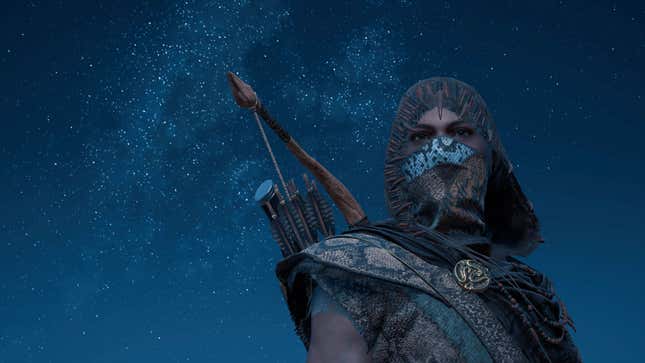
When I sat down with the makers of Assassin’s Creed Odyssey last week, I had to ask them about Alexios, Kassandra, and the state of the franchise’s playable modern-day sequences. I also had to ask them about the option to ride a flaming horse.
The flaming horse is a very small part of the huge Ubisoft game, but it’s a prime example of the tension under the discussion around Odyssey since its 2018 launch. This is a game loved by many critics and fans, but the extent to which it has bent so many of the Creed saga’s rules has riled some of the franchise’s most fervent followers.
“You still want to keep the core of the franchise there, but the franchise progresses and we try to make everybody happy,” Odyssey creative director Jonathan Dumont would tell me. “But it’s hard to make everybody happy.”
As my conversation with Dumont and producer Marc-Alexis Côté progressed, they confirmed that the game’s flow of free and paid downloadable expansions is winding down over the next few months. Our conversation amounted to a post-mortem.
Odyssey has been a marvel. It’s a massive, beautiful game that was well-reviewed and warmly received. It’s sold millions of copies despite going nearly head=tohead with Red Dead Redemption 2.
Côté explained that Odyssey’s player engagement is “higher than many of our multiplayer games,” noting that Ubisoft likes the fact that multiplayer games tend to keep players playing and wanting more (read: keep players willing to spend more money on the game at some point).
But there’s always a but, and with months of post-release content has also come some post-release discontent.
There are the fans miffed about the warping of the game’s lore. See, for example, the apparently changing explanations of where the assassin’s signature Leap Of Faith dive came from—if it was started by people in ancient Egypt as depicted in 2017’s Assassin’s Creed Origins, then why were Greek and Persian proto-assassins doing it in the Odyssey game set hundreds of years before that?
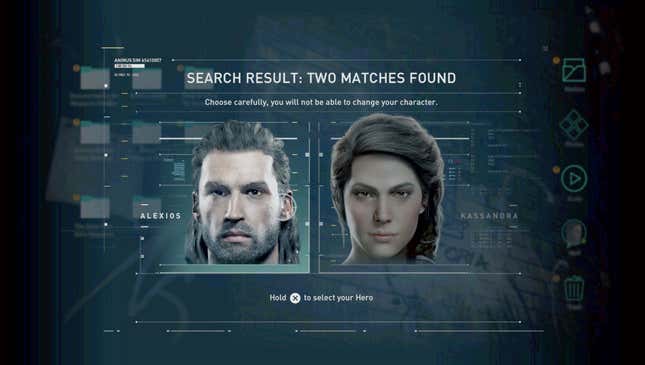
There was a concern among hardcore fans, spurred by an interview with game’s lead writer, that there might not be a series bible or that the creators might be depending on fan knowledge to keep the game going. That concern was based on a misunderstanding, Dumont and Côté told me. “We work very closely with Aymar [Azaïzia], who’s been the guardian of the lore. We talk regularly with Aymar to make sure everything we do works with the comic books, works with whatever within the lore,” Côté said. “There’s a brand bible,” he added. “There’s a 10 commandments.”
“And sometimes we bend some of it,” Dumont said.
I really should have asked them about those Leaps of Faith, but I confess I was drawn to talking about the flaming horse. They’re related, because they both involve Odyssey’s propensity to take the series’ restrictions and, perhaps as a nod to the to the titular Assassin’s Creed—”nothing is true, everything is permitted”—exceed them.
Assassin’s Creed was born in 2007 as a franchise fascinatingly constrained by rules. The historical characters that players would control were ancestors of a modern-day protagonist who experienced their memories via a DNA-reading device called the Animus. What players played was what happened. When they deviated by, say, killing civilians or failing a mission goal, they were making the modern-day character fail to re-experience the memory carefully and were not so much dying as “desynchronizing” from the historical memory. Magic was initially prohibited, but the games trafficked in wild science, a fantastical non-distinction to some but the guardrails of an internal logic to others. Eventually the magic rule was discarded, as was the rule that the character in the Animus had to be related to the one whose life was being played.
Odyssey bent the rules further. It introduced the idea that players could choose a character and the dialogue that character spoke, justifying it in-game with something or other about the vagueness in what the Animus could detect. As an aside, Côté said that about two thirds of players have chosen to play as Alexios, though he and Dumont had expected a 50/50 split or, if anything, a skew the other way. “I’m surprised by the numbers,” Côté said, “because most of the people I talk to play Kassandra.”
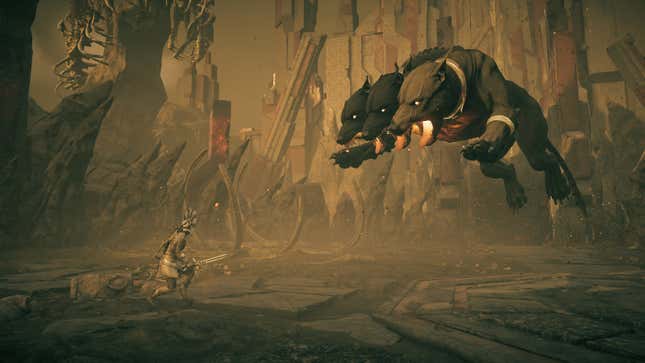
The game also pushed things by letting players battle creatures of Greek myth. The story pseudo-scientifically justified it by saying these creatures were created by the series’ well-established high-tech ancient civilization, the Isu. “If you don’t see a Minotaur when you play a game in ancient Greece, you feel like a letdown,” Dumont said, explaining the thought process for getting them into the game. “Somehow we need to connect these things. We decided it was good to put it on First Civilization stuff in there.”
If you can keep up with all the rule-bending, you might love it all, since it makes for a very good role-playing game. You might, however, find your own breaking point or at least something that bugs you enough that you can’t let it slide. That brings me back to that flaming horse.
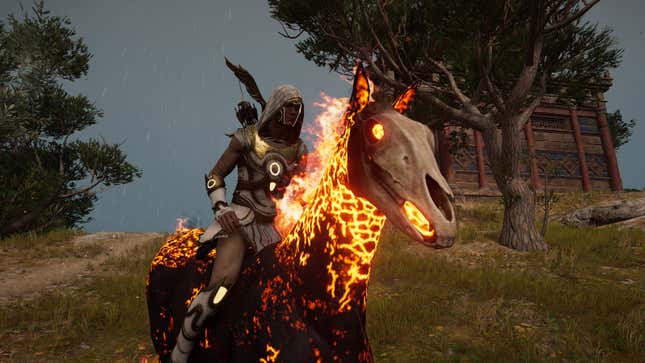
I took most of Odyssey’s liberties comfortably and enjoyed the game. But I found one thing strange and—dare I call the Assassin’s Creed cops—in violation of the rules as I understood them. I discovered that my reward for killing enough in-game mercenaries and achieving Tier 1 Mercenary status was the ability to turn my in-game horse into an in-game flaming horse. What historical memory of an ancient Greek mercenary could this possibly replicate? What manifestation of Isu tech could have caused Phobos, the steed of the great Kassandra of Kephallonia, to suddenly bear a coat of flame just because his rider had killed some really bad dudes? I am enough of a devoted player of Assassin’s Creed games that Dumont or Côté or their game could have just said, “Oh, that was Erudito’s doing,” and I’d be placated faster than it’d take you to Google Erudito. (I also am fully aware, thank you very much, that you could change in-game horses to unicorns all the way back in Assassin’s Creed Brotherhood via a cheat if you played several of the game’s missions perfectly.)
Instead, Dumont and Côté told me that it’s all about choice. It’s about choice when it comes to extravagant horse skins or fantastical, unrealistic armor. “It is optional to wear that stuff,” Dumont said. He said he wears one of the game’s more basic outfits but is happy it offers some wilder ones. “There’s a demand for it, people do want that stuff in the game,” he said. “As long as we’re not forcing you to have a flaming horse or a flaming suit or a bow that shoots through walls, then I think it’s OK.” I’m either in the bargaining or acceptance phase about this.
“We try to give more options and make the game more open,” Côté said, “Within this openness you can still play the game the way you want to. But sometimes people are insulted by things that they don’t even do because they are offered to the player, which I find sad because to me, it makes the game more inclusive and it opens it up to more playstyles.”
Dumont mentioned that his daughter uses a unicorn variation for her in-game horse. “Why not?” he said.
They added that they felt the series needs to continue to evolve and that some old restrictions are worth getting past. “How fun is it nowadays if you’re in a quest and you do something that’s unallowed by the quest and—boom—you’ve desynchronized?” Côté said. “We want to make games that are more open, more tolerant. You can finish quests before you even start them in Odyssey. That’s a huge engineering effort, a huge design effort but it goes against the commandments in a way.”
“Choice” is certainly the buzz concept for Odyssey, and it’s the crux of many discussions about the game. It drove the frustration players expressed when Odyssey left them free to choose gay or straight romantic couplings throughout the main game but then forced a heterosexual sexual relationship on players in an expansion (something the developers apologized for).
Choice, coupled with economics, also drove the discussion about the game’s overall design, its vast scale, and a $10 microtransaction offered at launch that would make leveling up faster. This was the game’s first post-release controversy. Some players felt that their character was leveling up too slowly for the game to be enjoyable and that Ubisoft was thus driving them toward the microtransaction. Others, like me, took enough of a wandering path through the game’s comical number of sidequests that leveling up was never an issue. The presence of that booster, though, raised the question of what was really going on, and the frustration about leveling has lingered long enough that players of the game’s recently added Story Creator mode have made quests that just rapidly level you up.
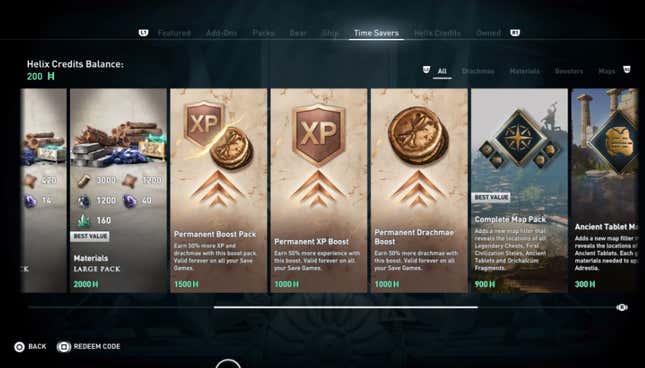
“I felt when we made the game we made the game to be 200 hours if you wanted,” Dumont said, noting that he played through the game nine times before it shipped without ever activating the booster. “I never thought about using it.”
So how did the booster even get into the game? “It’s a discussion between the production team and our business teams,” Côté said. “It’s like: This is a trend in the industry. We know we want this game to be profitable. Some people are willing to pay for this. Me as a developer, as someone who takes our players’ interest at heart, it’s important for me that the game is not balanced this way. Some players want to go faster, so the option is there.”
Here’s another choice that the designers of Odyssey and other recent Assassin’s Creed games wrestled with: whether to include playable sequences in modern day. While the bulk of every Assassin’s Creed game has occurred in a historical setting, all have included sequences set in modern day. From the start, they were divisive. Modern-era gameplay tended to involve walking, talking, and maybe climbing around in a few rooms. None of it was nearly as exciting, dynamic or, presumably, as marketable as the parts of the games set in the Crusades, the Renaissance, or the American revolution. Some people (hello!) dug it. Others wanted it gone.
By 2014’s Assassin’s Creed Unity and 2015’s Assassin’s Creed Syndicate, the modern-day material had been reduced to several minutes of cutscenes, with nothing playable. Dumont and Côté’s hoped the approach they took with Syndicate would work: “ Quite honestly and transparently, we were like, ‘OK, people don’t seem to like the gameplay, but they like the lore, so we tried to just give them lore,’” Côté said. It wasn’t very satisfying. “I think the fans wanted to kill me on Twitter and Reddit,” he recalled. Côté credits the resurgence of modern-day sequences in the series to fans’ requests.
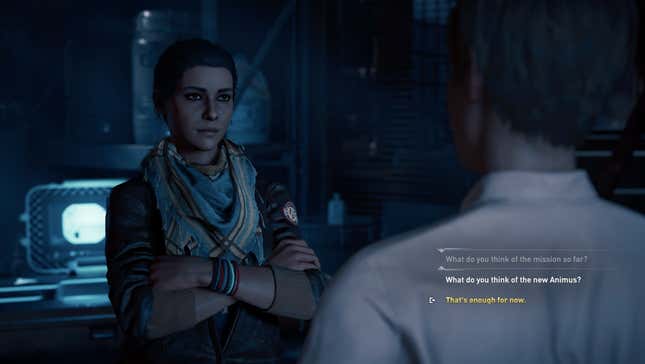
In 2017, Assassin’s Creed Origins brought modern-day gameplay back with a new playable character named Layla Hassan. Her role was expanded in Odyssey, though mostly in the game’s second episodic expansion, which still has one chapter to go. “Layla’s story is going to progress quite a bit [through the final chapter],” Dumont said. He noted that they’d primarily explored her story, the Isu, and other extended parts of the Assassin’s Creed lore and universe in the game’s expansions, which have a more hardcore audience. “Some people like it, and some people don’t want it in the main game,” he said. “It’s tough to balance that act, but I think with the DLC we’re addressing more core fans.”
Dumont and Côté’s work on Assassin’s Creed Odyssey is all but done. The game’s second episodic expansion only has one chapter to go, likely releasing in July. The surprisingly elaborate Tales From Greece quests, which have been added for free each month since launch, should wind down soon, too. The game’s educational Discovery Tour mode will come out in the fall, possibly in September.
“We have told the story we want to tell,” Côté said, confirming there is no more DLC planned beyond the game’s first year of announced content. “There is not a year-two plan,” he said, before referencing the game’s recently added Story Creator mode: “The year two plan is: ‘Here’s the story, create your own stories.’”
As for sections of the game they think players might still not have found or at least should prioritize checking out, Dumont recommends the visiting Pephka, where people are obsessed with the Minotaur, as well as quests involving the sculptor Phidias. He also suggests trying to find one of the game’s first characters, Marcos, again. He said the team hid him on the most remote island possible. Mostly, he just recommends players keep exploring: “I think it’s a game where, if you slow down and look at it, there’s marvelous things that come out. I don’t know all of them.”